|
SNAP Library , Developer Reference
2013-01-07 14:03:36
SNAP, a general purpose, high performance system for analysis and manipulation of large networks
|
|
SNAP Library , Developer Reference
2013-01-07 14:03:36
SNAP, a general purpose, high performance system for analysis and manipulation of large networks
|
#include <exp.h>
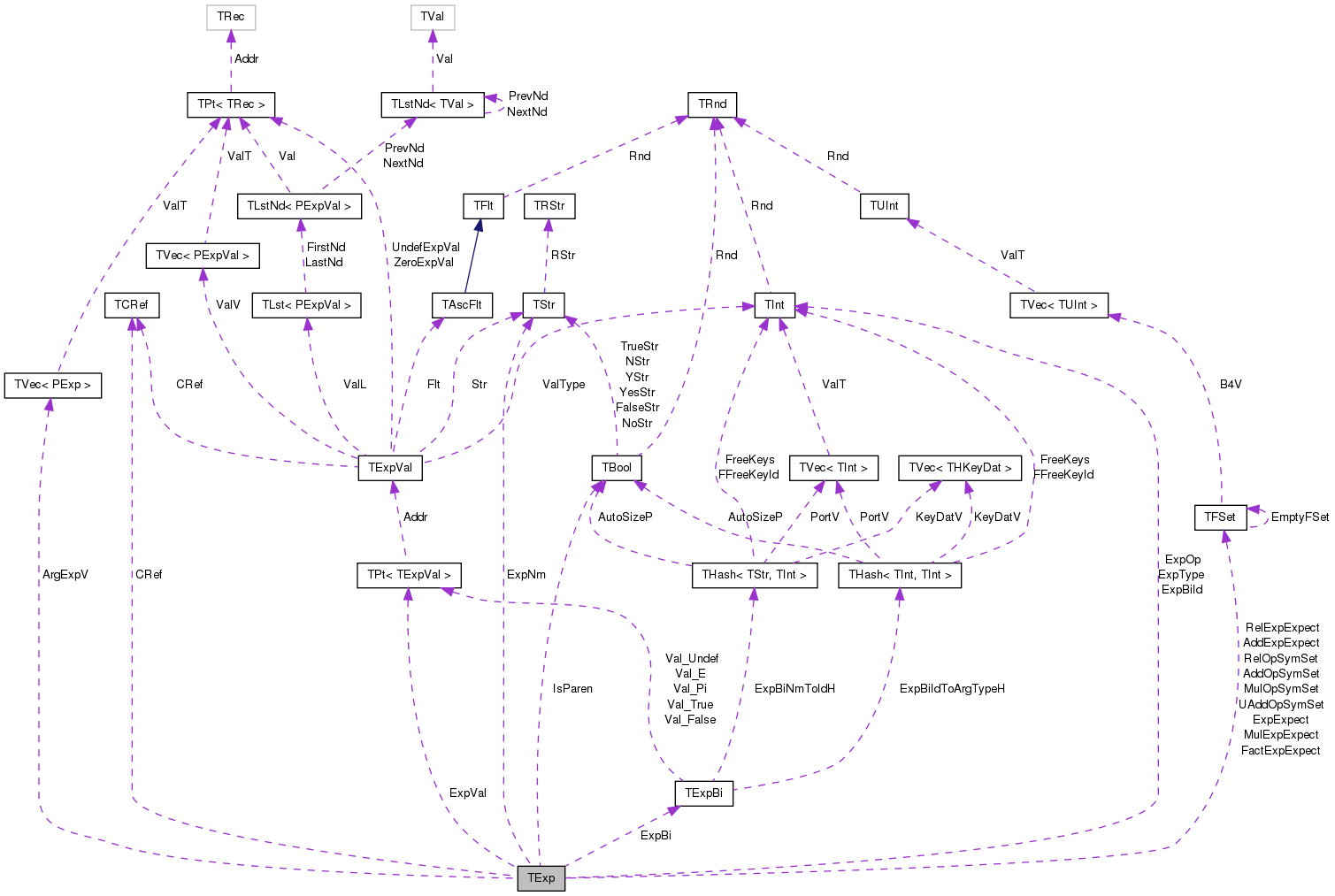
Public Member Functions | |
| TExp (const TExpType &_ExpType=etUndef) | |
| TExp (const TExpOp &_ExpOp, const PExp &Exp1, const PExp &Exp2=NULL, const PExp &Exp3=NULL) | |
| TExp (const PExpVal &_ExpVal) | |
| TExp (const TStr &_VarNm) | |
| TExp (const TStr &_FuncNm, const TExpV &_ArgExpV) | |
| ~TExp () | |
| TExp (TSIn &SIn) | |
| void | Save (TSOut &SOut) const |
| TExp & | operator= (const TExp &) |
| bool | operator== (const TExp &) const |
| void | SaveTxt (TOLx &Lx) const |
| void | SaveTxt (const PSOut &SOut) const |
| TStr | GetStr () const |
| TStr | GetTopObjNm () const |
| int | GetArgExps () const |
| TStr | GetArgExpStr (const int &ArgExpN) const |
| PExpVal | Eval (bool &Ok, TStr &MsgStr, const bool &DbgP, TStr &DbgStr, const PExpEnv &ExpEnv=TExpEnv::DfExpEnv) |
| PExpVal | Eval (const PExpEnv &ExpEnv=TExpEnv::DfExpEnv) |
| PExpVal | Eval (bool &Ok, TStr &MsgStr, const PExpEnv &ExpEnv=TExpEnv::DfExpEnv) |
| PExpVal | Eval (const PExpEnv &ExpEnv, const bool &DbgP, TStr &DbgStr) |
Static Public Member Functions | |
| static PExp | Load (TSIn &SIn) |
| static bool | IsExpStrOk (const TStr &ExpStr, TStr &MsgStr) |
| static PExp | LoadTxt (const PSIn &SIn, bool &Ok, TStr &MsgStr, const TFSet &Expect=TFSet()|syEof) |
| static PExp | LoadTxt (const TStr &ExpStr, bool &Ok, TStr &MsgStr) |
| static PExp | LoadTxt (const TStr &ExpStr) |
| static PExpVal | LoadAndEvalExpL (const TStr &ExpLStr, bool &Ok, TStr &MsgStr, const PExpEnv &ExpEnv=TExpEnv::DfExpEnv) |
| static TStr | GetExpTypeStr (const TExpType &ExpType) |
| static TStr | GetExpOpStr (const TExpOp &ExpOp) |
| static void | GetBiDescV (TStrPrV &BiDescV) |
Private Member Functions | |
| void | SaveTxtOp (TOLx &Lx) const |
| PExpVal | EvalExpOp (const PExpEnv &ExpEnv, const bool &DbgP, TChA &DbgChA) |
| PExpVal | EvalExp (const PExpEnv &ExpEnv, const bool &DbgP, TChA &DbgChA) |
Static Private Member Functions | |
| static TExpOp | GetExpOpFromLxSym (const TLxSym &LxSym) |
| static TLxSym | GetLxSymFromExpOp (const TExpOp &ExpOp) |
| static PExp | LoadTxtFact (TILx &Lx, const TFSet &Expect) |
| static PExp | LoadTxtMulExp (TILx &Lx, const TFSet &Expect) |
| static PExp | LoadTxtAddExp (TILx &Lx, const TFSet &Expect) |
| static PExp | LoadTxtRelExp (TILx &Lx, const TFSet &Expect) |
| static PExp | LoadTxtExp (TILx &Lx, const TFSet &Expect) |
Private Attributes | |
| TCRef | CRef |
| TInt | ExpType |
| TBool | IsParen |
| PExpVal | ExpVal |
| TStr | ExpNm |
| TInt | ExpOp |
| TInt | ExpBiId |
| TExpV | ArgExpV |
Static Private Attributes | |
| static TExpBi | ExpBi |
| static const TFSet | MulOpSymSet |
| static const TFSet | UAddOpSymSet |
| static const TFSet | AddOpSymSet |
| static const TFSet | RelOpSymSet |
| static const TFSet | FactExpExpect |
| static const TFSet | MulExpExpect |
| static const TFSet | AddExpExpect |
| static const TFSet | RelExpExpect |
| static const TFSet | ExpExpect |
Friends | |
| class | TPt< TExp > |
| TExp::TExp | ( | const TExpType & | _ExpType = etUndef | ) | [inline] |
Definition at line 213 of file exp.h.
Referenced by LoadAndEvalExpL(), LoadTxt(), LoadTxtAddExp(), LoadTxtExp(), LoadTxtFact(), LoadTxtMulExp(), and LoadTxtRelExp().

| TExp::TExp | ( | const TExpOp & | _ExpOp, |
| const PExp & | Exp1, | ||
| const PExp & | Exp2 = NULL, |
||
| const PExp & | Exp3 = NULL |
||
| ) |
Definition at line 771 of file exp.cpp.
References TVec< TVal >::Add(), ArgExpV, and TPt< TRec >::Empty().
: ExpType(etOp), IsParen(false), ExpVal(), ExpNm(), ExpOp(_ExpOp), ExpBiId(), ArgExpV(){ ArgExpV.Add(Exp1); if (!Exp2.Empty()){ArgExpV.Add(Exp2);} if (!Exp3.Empty()){ArgExpV.Add(Exp3);} }

| TExp::TExp | ( | const PExpVal & | _ExpVal | ) |
| TExp::TExp | ( | const TStr & | _VarNm | ) |
Definition at line 784 of file exp.cpp.
References etBiConst, etVar, ExpBi, ExpBiId, ExpNm, ExpType, and TExpBi::IsExpBiId().
: ExpType(), IsParen(false), ExpVal(), ExpNm(_VarNm), ExpOp(), ExpBiId(), ArgExpV(){ TExpBiId _ExpBiId; if (ExpBi.IsExpBiId(ExpNm, _ExpBiId)){ ExpType=etBiConst; ExpBiId=TInt(int(_ExpBiId)); } else { ExpType=etVar; } }

| TExp::TExp | ( | const TStr & | _FuncNm, |
| const TExpV & | _ArgExpV | ||
| ) |
Definition at line 796 of file exp.cpp.
References etBiFunc, etFunc, ExpBi, ExpBiId, ExpNm, ExpType, and TExpBi::IsExpBiId().
: ExpType(), IsParen(false), ExpVal(), ExpNm(_FuncNm), ExpOp(), ExpBiId(), ArgExpV(_ArgExpV){ TExpBiId _ExpBiId; if (ExpBi.IsExpBiId(ExpNm, _ExpBiId)){ ExpType=etBiFunc; ExpBiId=TInt(int(_ExpBiId)); } else { ExpType=etFunc; } }

| TExp::~TExp | ( | ) | [inline] |
| TExp::TExp | ( | TSIn & | SIn | ) | [inline] |
| PExpVal TExp::Eval | ( | bool & | Ok, |
| TStr & | MsgStr, | ||
| const bool & | DbgP, | ||
| TStr & | DbgStr, | ||
| const PExpEnv & | ExpEnv = TExpEnv::DfExpEnv |
||
| ) |
Definition at line 898 of file exp.cpp.
References EvalExp(), ExpVal, TExpVal::GetStr(), GetStr(), and TExpVal::GetUndefExpVal().
{
Ok=true; MsgStr="Ok";
PExpVal ExpVal; TChA DbgChA;
if (DbgP){DbgChA+="Debug Expression: ";}
try {
ExpVal=EvalExp(ExpEnv, DbgP, DbgChA);
}
catch (PExcept E){
Ok=false; MsgStr=E->GetMsgStr();
}
if (!Ok){return TExpVal::GetUndefExpVal();}
if (DbgP){
DbgChA+='['; DbgChA+=GetStr(); DbgChA+=" -> ";
DbgChA+=ExpVal->GetStr(); DbgChA+="] "; DbgChA+=MsgStr;
DbgStr=DbgChA;
}
return ExpVal;
}
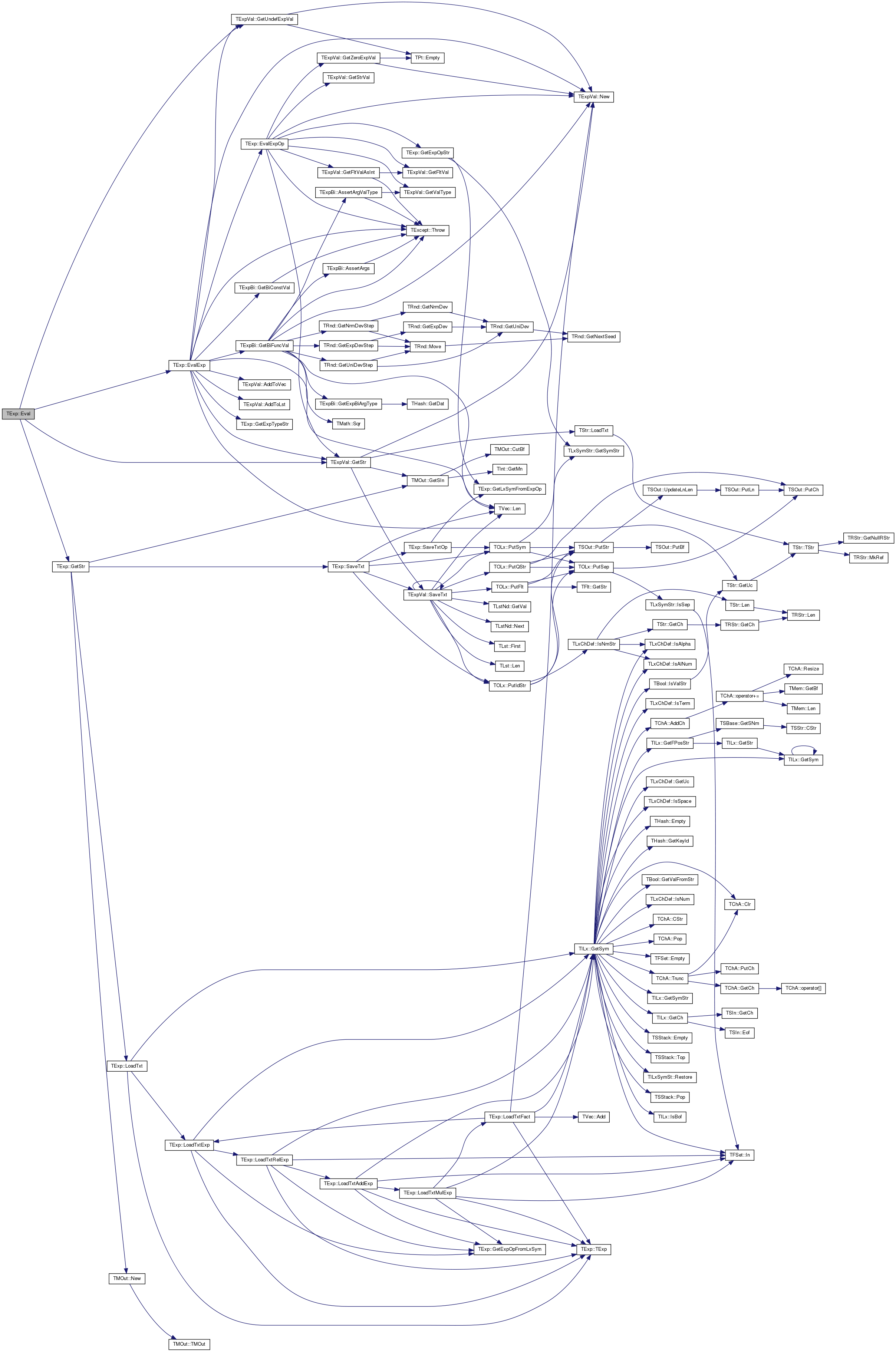
| PExpVal TExp::Eval | ( | const PExpEnv & | ExpEnv = TExpEnv::DfExpEnv | ) | [inline] |
| PExpVal TExp::Eval | ( | bool & | Ok, |
| TStr & | MsgStr, | ||
| const PExpEnv & | ExpEnv = TExpEnv::DfExpEnv |
||
| ) | [inline] |
| PExpVal TExp::Eval | ( | const PExpEnv & | ExpEnv, |
| const bool & | DbgP, | ||
| TStr & | DbgStr | ||
| ) | [inline] |
| PExpVal TExp::EvalExp | ( | const PExpEnv & | ExpEnv, |
| const bool & | DbgP, | ||
| TChA & | DbgChA | ||
| ) | [private] |
Definition at line 517 of file exp.cpp.
References TExpVal::AddToLst(), TExpVal::AddToVec(), ArgExpV, etBiConst, etBiFunc, etFunc, etLst, etOp, etUndef, etVal, etVar, etVec, EvalExpOp(), evtLst, evtVec, ExpBi, ExpBiId, ExpNm, ExpType, ExpVal, Fail, TExpBi::GetBiConstVal(), TExpBi::GetBiFuncVal(), GetExpTypeStr(), TExpVal::GetStr(), TStr::GetUc(), TExpVal::GetUndefExpVal(), TVec< TVal >::Len(), TExpVal::New(), and TExcept::Throw().
Referenced by Eval().
{
PExpVal OutExpVal;
TExpType _ExpType=TExpType(int(ExpType));
switch (_ExpType){
case etUndef:
OutExpVal=TExpVal::GetUndefExpVal();
break;
case etVal:
OutExpVal=ExpVal;
break;
case etVec:{
PExpVal ExpVal=TExpVal::New(evtVec);
for (int ArgExpN=0; ArgExpN<ArgExpV.Len(); ArgExpN++){
PExpVal ArgExpVal=
PExpVal(ArgExpV[ArgExpN]->EvalExp(ExpEnv, DbgP, DbgChA));
ExpVal->AddToVec(ArgExpVal);
}
OutExpVal=ExpVal;
break;}
case etLst:{
PExpVal ExpVal=TExpVal::New(evtLst);
for (int ArgExpN=0; ArgExpN<ArgExpV.Len(); ArgExpN++){
PExpVal ArgExpVal=
PExpVal(ArgExpV[ArgExpN]->EvalExp(ExpEnv, DbgP, DbgChA));
ExpVal->AddToLst(ArgExpVal);
}
OutExpVal=ExpVal;
break;}
case etOp:
OutExpVal=EvalExpOp(ExpEnv, DbgP, DbgChA); break;
case etVar:{
bool IsVar=false;
PExpVal ExpVal=ExpEnv->GetVarVal(ExpNm.GetUc(), IsVar);
if (!IsVar){TExcept::Throw(TStr("Variable not defined (")+ExpNm+").");}
OutExpVal=ExpVal;
break;}
case etBiConst:
OutExpVal=ExpBi.GetBiConstVal(TExpBiId(int(ExpBiId)));
break;
case etFunc:
case etBiFunc:{
TExpValV ArgExpValV(ArgExpV.Len(), 0);
for (int ArgExpN=0; ArgExpN<ArgExpV.Len(); ArgExpN++){
PExpVal ArgExpVal=
PExpVal(ArgExpV[ArgExpN]->EvalExp(ExpEnv, DbgP, DbgChA));
ArgExpValV.Add(ArgExpVal);
}
switch (_ExpType){
case etFunc:{
bool IsFunc=false;
PExpVal ExpVal=ExpEnv->GetFuncVal(ExpNm.GetUc(), ArgExpValV, IsFunc);
if (!IsFunc){
TExcept::Throw(TStr("Function not defined (")+ExpNm+").");}
OutExpVal=ExpVal;
break;}
case etBiFunc:
OutExpVal=ExpBi.GetBiFuncVal(TExpBiId(int(ExpBiId)), ArgExpValV, ExpEnv);
break;
default: Fail; OutExpVal=NULL;
}
break;}
default: Fail; OutExpVal=NULL;
}
if (DbgP){
switch (_ExpType){
case etVal:
case etOp:
break;
case etUndef:
case etVec:
case etLst:{
TStr ExpTypeStr=TExp::GetExpTypeStr(_ExpType);
DbgChA+='['; DbgChA+=ExpTypeStr; DbgChA+='=';
DbgChA+=OutExpVal->GetStr(); DbgChA+="] ";
break;}
case etVar:
case etBiConst:
case etFunc:
case etBiFunc:
DbgChA+='['; DbgChA+=ExpNm; DbgChA+='=';
DbgChA+=OutExpVal->GetStr(); DbgChA+="] ";
break;
default: Fail;
}
}
return OutExpVal;
}
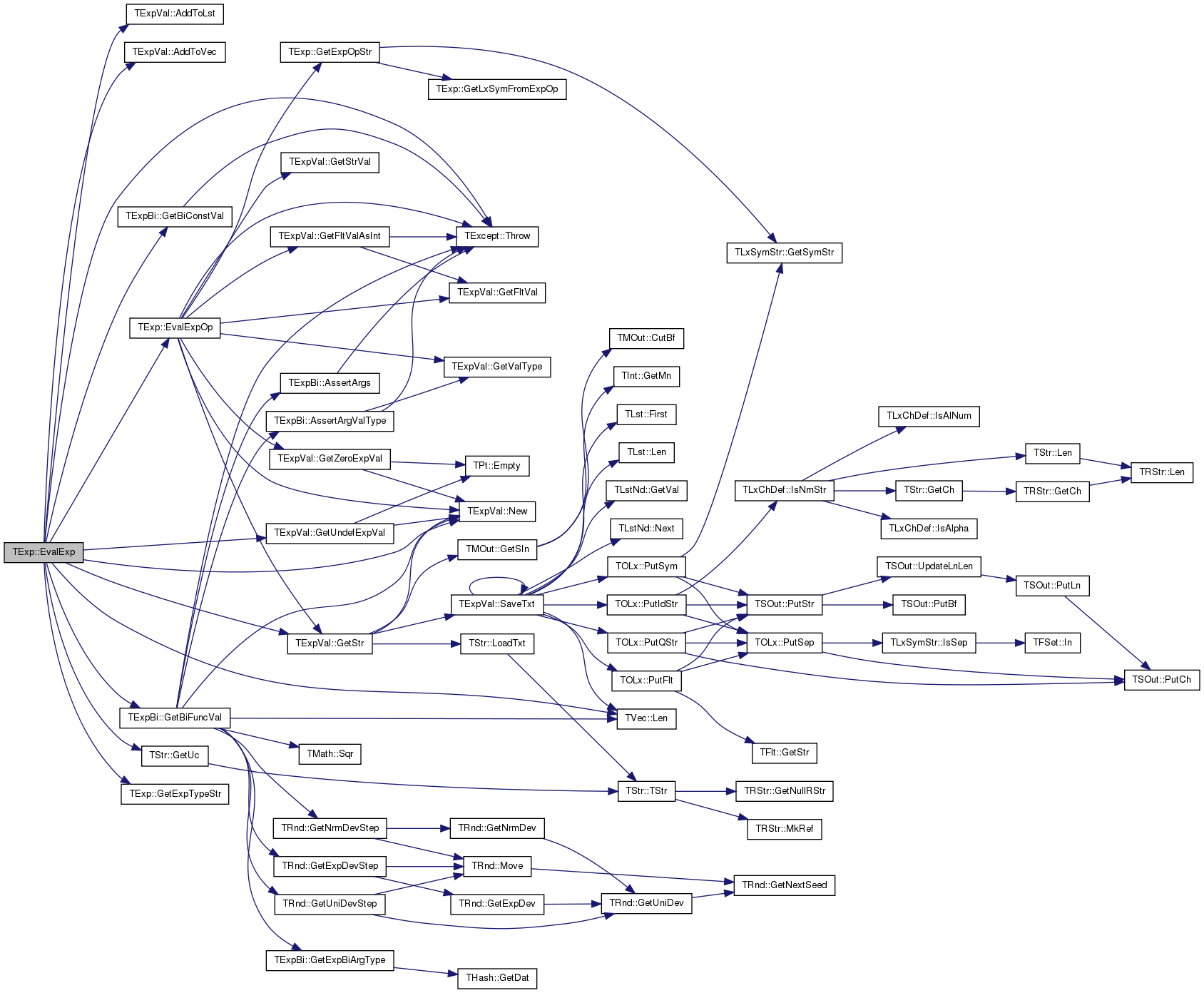

| PExpVal TExp::EvalExpOp | ( | const PExpEnv & | ExpEnv, |
| const bool & | DbgP, | ||
| TChA & | DbgChA | ||
| ) | [private] |
Definition at line 377 of file exp.cpp.
References ArgExpV, eoAnd, eoDiv, eoEq, eoGEq, eoGtr, eoIDiv, eoIf, eoLEq, eoLss, eoMinus, eoMod, eoMul, eoNEq, eoNot, eoOr, eoPlus, eoUMinus, eoUPlus, evtFlt, evtStr, ExpOp, ExpVal, Fail, GetExpOpStr(), TExpVal::GetFltVal(), TExpVal::GetFltValAsInt(), TExpVal::GetStr(), TExpVal::GetStrVal(), TExpVal::GetValType(), TExpVal::GetZeroExpVal(), TExpVal::New(), and TExcept::Throw().
Referenced by EvalExp().
{
PExpVal OutExpVal;
TExpOp _ExpOp=TExpOp(int(ExpOp));
switch (_ExpOp){
case eoUPlus:
case eoUMinus:
case eoNot:{
PExpVal ExpVal=ArgExpV[0]->EvalExp(ExpEnv, DbgP, DbgChA);
TExpValType ExpValType=ExpVal->GetValType();
if (ExpValType==evtFlt){
TFlt Flt;
switch (_ExpOp){
case eoUPlus: Flt=ExpVal->GetFltVal(); break;
case eoUMinus: Flt=-ExpVal->GetFltVal(); break;
case eoNot: Flt=double(ExpVal->GetFltValAsInt()==0);
default: Fail; Flt=0;
}
OutExpVal=TExpVal::New(Flt);
} else {
TExcept::Throw("Bad argument types.");
}
break;}
case eoPlus:
case eoMinus:
case eoMul:
case eoDiv:
case eoIDiv:
case eoMod:
case eoAnd:
case eoOr:{
PExpVal LExpVal=ArgExpV[0]->EvalExp(ExpEnv, DbgP, DbgChA);
PExpVal RExpVal=ArgExpV[1]->EvalExp(ExpEnv, DbgP, DbgChA);
TExpValType LExpValType=LExpVal->GetValType();
TExpValType RExpValType=RExpVal->GetValType();
if ((LExpValType==evtFlt)&&(RExpValType==evtFlt)){
// check left expression
double LVal=LExpVal->GetFltVal();
int LValExpon; frexp(LVal, &LValExpon);
if (LValExpon>150){LExpVal=TExpVal::GetZeroExpVal();}
// check right expression
double RVal=LExpVal->GetFltVal();
int RValExpon; frexp(RVal, &RValExpon);
if (RValExpon>150){RExpVal=TExpVal::GetZeroExpVal();}
// calculate
TFlt Flt;
switch (_ExpOp){
case eoPlus: Flt=LExpVal->GetFltVal()+RExpVal->GetFltVal(); break;
case eoMinus: Flt=LExpVal->GetFltVal()-RExpVal->GetFltVal(); break;
case eoMul: Flt=LExpVal->GetFltVal()*RExpVal->GetFltVal(); break;
case eoDiv:
if (RExpVal->GetFltVal()==0){TExcept::Throw("Division by zero.");}
else {Flt=LExpVal->GetFltVal()/RExpVal->GetFltVal();}
break;
case eoIDiv:
if (RExpVal->GetFltValAsInt()==0){TExcept::Throw("Division by zero.");}
else {Flt=LExpVal->GetFltValAsInt()/RExpVal->GetFltValAsInt();}
break;
case eoMod:
if (RExpVal->GetFltValAsInt()==0){TExcept::Throw("Division by zero.");}
else {Flt=LExpVal->GetFltValAsInt()%RExpVal->GetFltValAsInt();}
break;
case eoAnd:
Flt=(LExpVal->GetFltValAsInt()!=0)&&(RExpVal->GetFltValAsInt()!=0); break;
case eoOr:
Flt=(LExpVal->GetFltValAsInt()!=0)||(RExpVal->GetFltValAsInt()!=0); break;
default: Fail; Flt=0;
}
OutExpVal=TExpVal::New(Flt);
} else
if ((_ExpOp==eoPlus)&&(LExpValType==evtStr)&&(RExpValType==evtStr)){
TStr Str=LExpVal->GetStrVal()+RExpVal->GetStrVal();
OutExpVal=TExpVal::New(Str);
} else {
TExcept::Throw("Bad argument types.");
}
break;}
case eoEq:
case eoNEq:
case eoLss:
case eoGtr:
case eoLEq:
case eoGEq:{
PExpVal LExpVal=ArgExpV[0]->EvalExp(ExpEnv, DbgP, DbgChA);
PExpVal RExpVal=ArgExpV[1]->EvalExp(ExpEnv, DbgP, DbgChA);
TExpValType LExpValType=LExpVal->GetValType();
TExpValType RExpValType=RExpVal->GetValType();
if ((LExpValType==evtFlt)&&(RExpValType==evtFlt)){
TFlt Flt;
switch (_ExpOp){
case eoEq: Flt=double(LExpVal->GetFltVal()==RExpVal->GetFltVal()); break;
case eoNEq: Flt=double(LExpVal->GetFltVal()!=RExpVal->GetFltVal()); break;
case eoLss: Flt=double(LExpVal->GetFltVal()<RExpVal->GetFltVal()); break;
case eoGtr: Flt=double(LExpVal->GetFltVal()>RExpVal->GetFltVal()); break;
case eoLEq: Flt=double(LExpVal->GetFltVal()<=RExpVal->GetFltVal()); break;
case eoGEq: Flt=double(LExpVal->GetFltVal()>=RExpVal->GetFltVal()); break;
default: Fail; Flt=0;
}
OutExpVal=TExpVal::New(Flt);
} else
if ((LExpValType==evtStr)&&(RExpValType==evtStr)){
TFlt Flt;
switch (_ExpOp){
case eoEq: Flt=double(LExpVal->GetStrVal()==RExpVal->GetStrVal()); break;
case eoNEq: Flt=double(LExpVal->GetStrVal()!=RExpVal->GetStrVal()); break;
case eoLss: Flt=double(LExpVal->GetStrVal()<RExpVal->GetStrVal()); break;
case eoGtr: Flt=double(LExpVal->GetStrVal()>RExpVal->GetStrVal()); break;
case eoLEq: Flt=double(LExpVal->GetStrVal()<=RExpVal->GetStrVal()); break;
case eoGEq: Flt=double(LExpVal->GetStrVal()>=RExpVal->GetStrVal()); break;
default: Fail; Flt=0;
}
OutExpVal=TExpVal::New(Flt);
} else {
TExcept::Throw("Bad argument types.");
}
break;}
case eoIf:{
PExpVal CondExpVal=ArgExpV[0]->EvalExp(ExpEnv, DbgP, DbgChA);
TExpValType CondExpValType=CondExpVal->GetValType();
if (CondExpValType==evtFlt){
PExpVal ExpVal;
if (CondExpVal->GetFltVal()!=0){
ExpVal=ArgExpV[1]->EvalExp(ExpEnv, DbgP, DbgChA);
} else {
ExpVal=ArgExpV[2]->EvalExp(ExpEnv, DbgP, DbgChA);
}
OutExpVal=ExpVal;
} else {
TExcept::Throw("Bad argument types.");
}
break;}
default: Fail; OutExpVal=NULL;
}
if (DbgP){
DbgChA+="['"; DbgChA+=TExp::GetExpOpStr(_ExpOp);
DbgChA+="'='"; DbgChA+=OutExpVal->GetStr(); DbgChA+="'] ";
}
return OutExpVal;
}
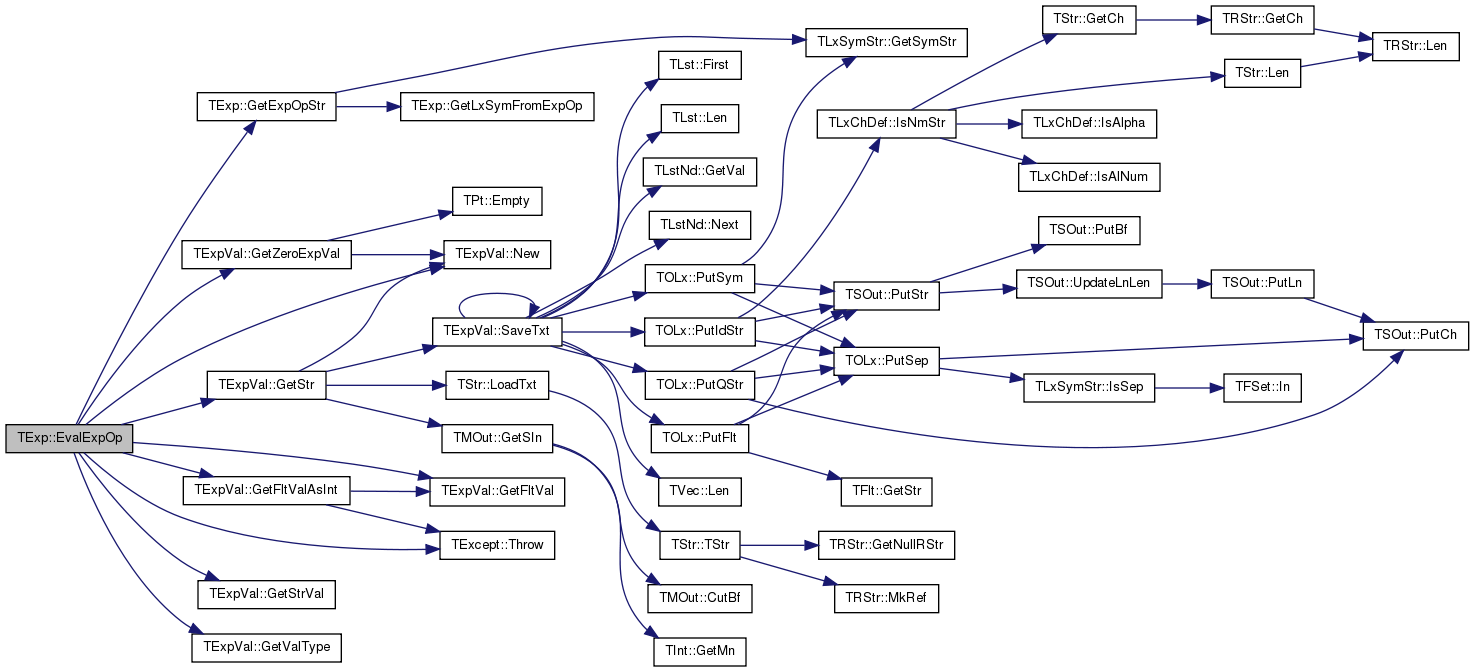

| int TExp::GetArgExps | ( | ) | const |
| TStr TExp::GetArgExpStr | ( | const int & | ArgExpN | ) | const |
| void TExp::GetBiDescV | ( | TStrPrV & | BiDescV | ) | [static] |
Definition at line 967 of file exp.cpp.
References TVec< TVal >::Add(), and TVec< TVal >::Clr().
{
BiDescV.Clr();
// constants
BiDescV.Add(TStrPr("True", "Logical 'True' == 1."));
BiDescV.Add(TStrPr("False", "Logical 'False' == 0."));
BiDescV.Add(TStrPr("E", "Nat. logarithm basis (2.7182...)."));
BiDescV.Add(TStrPr("Pi", "Constant pi (3.1415...)."));
// trigonometric funcions
BiDescV.Add(TStrPr("Sin(X)", "Sine of angle in radians."));
BiDescV.Add(TStrPr("Cos(X)", "Cosine of angle in radians."));
BiDescV.Add(TStrPr("Tan(X)", "Tangent of angle in radians."));
BiDescV.Add(TStrPr("ASin(X)", "Arc sine of (-1..+1)."));
BiDescV.Add(TStrPr("ACos(X)", "Arc cosine of (-1..+1)."));
BiDescV.Add(TStrPr("ATan(X)", "Arc tangent of (-inf..+inf)."));
BiDescV.Add(TStrPr("SinH(X)", "Hyperbolic sine."));
BiDescV.Add(TStrPr("CosH(X)", "Hyperbolic cosine."));
BiDescV.Add(TStrPr("TanH(X)", "Hyperbolic tangent."));
// exponential functions
BiDescV.Add(TStrPr("Pow(X, Y)", "X to the power of Y."));
BiDescV.Add(TStrPr("Exp(X)", "Exponential E to the power of X."));
BiDescV.Add(TStrPr("Sqr(X)", "X squared."));
BiDescV.Add(TStrPr("Sqrt(X)", "Positive square root."));
BiDescV.Add(TStrPr("Log(X)", "Natural logarithm."));
BiDescV.Add(TStrPr("Log10(X)", "Base 10 logarithm."));
// number manipulation functions
BiDescV.Add(TStrPr("Ceil(X)", "The smallest integer not less than X."));
BiDescV.Add(TStrPr("Floor(X)", "The largest integer not greater than X."));
BiDescV.Add(TStrPr("Int(X)", "Integer part of X."));
BiDescV.Add(TStrPr("Frac(X)", "Fractional part of X."));
BiDescV.Add(TStrPr("Abs(X)", "Absolute value of X."));
// random deviates
BiDescV.Add(TStrPr("UniDev()", "Uniform deviate (0..1)."));
BiDescV.Add(TStrPr("NrmDev()", "Normal deviate (0, 1)."));
BiDescV.Add(TStrPr("ExpDev()", "Exponential deviate."));
BiDescV.Add(TStrPr("GamDev(Order)", "Gamma deviate of Order."));
BiDescV.Add(TStrPr("PoiDev(Mean)", "Poisson deviate."));
BiDescV.Add(TStrPr("BinDev(Prb, Trials)", "Binomial deviate."));
// operators
BiDescV.Add(TStrPr("+N", "Unary plus."));
BiDescV.Add(TStrPr("-N", "Unary minus."));
BiDescV.Add(TStrPr("!L", "Not."));
BiDescV.Add(TStrPr("N1+N2", "Plus."));
BiDescV.Add(TStrPr("N1-N2", "Minus."));
BiDescV.Add(TStrPr("N1*N2", "Multiply."));
BiDescV.Add(TStrPr("N1/N2", "Division."));
BiDescV.Add(TStrPr("N1#N2", "Integer division."));
BiDescV.Add(TStrPr("N1%N2", "Modulo."));
BiDescV.Add(TStrPr("L1&L2", "And."));
BiDescV.Add(TStrPr("L1|L2", "Or."));
BiDescV.Add(TStrPr("E1=E2", "Equal."));
BiDescV.Add(TStrPr("E1<>E2", "Not equal."));
BiDescV.Add(TStrPr("E1<E2", "Less."));
BiDescV.Add(TStrPr("E1>E2", "Greater."));
BiDescV.Add(TStrPr("E1<=E2", "Less or equal."));
BiDescV.Add(TStrPr("E1>=E2", "Greater or equal."));
BiDescV.Add(TStrPr("L?E1:E2", "If L then return E1 else return E2."));
}

| TExpOp TExp::GetExpOpFromLxSym | ( | const TLxSym & | LxSym | ) | [static, private] |
Definition at line 606 of file exp.cpp.
References eoAnd, eoDiv, eoEq, eoGEq, eoGtr, eoIDiv, eoIf, eoLEq, eoLss, eoMinus, eoMod, eoMul, eoNEq, eoNot, eoOr, eoPlus, eoUndef, Fail, syAmpersand, syAsterisk, syEq, syExclamation, syGEq, syGtr, syHash, syLEq, syLss, syMinus, syNEq, syPercent, syPlus, syQuestion, sySlash, and syVBar.
Referenced by LoadTxtAddExp(), LoadTxtExp(), LoadTxtMulExp(), and LoadTxtRelExp().
{
switch (LxSym){
case syPlus: return eoPlus;
case syMinus: return eoMinus;
case syAsterisk: return eoMul;
case sySlash: return eoDiv;
case syPercent: return eoMod;
case syExclamation: return eoNot;
case syVBar: return eoOr;
case syAmpersand: return eoAnd;
case syQuestion: return eoIf;
case syHash: return eoIDiv;
case syEq: return eoEq;
case syNEq: return eoNEq;
case syLss: return eoLss;
case syGtr: return eoGtr;
case syLEq: return eoLEq;
case syGEq: return eoGEq;
default: Fail; return eoUndef;
}
}

| static TStr TExp::GetExpOpStr | ( | const TExpOp & | ExpOp | ) | [inline, static] |
Definition at line 266 of file exp.h.
References GetLxSymFromExpOp(), and TLxSymStr::GetSymStr().
Referenced by EvalExpOp(), and GetTopObjNm().
{
return TLxSymStr::GetSymStr(TExp::GetLxSymFromExpOp(ExpOp));}


| TStr TExp::GetExpTypeStr | ( | const TExpType & | ExpType | ) | [static] |
Definition at line 952 of file exp.cpp.
References etBiConst, etBiFunc, etFunc, etLst, etOp, etUndef, etVal, etVar, etVec, and Fail.
Referenced by EvalExp().
{
switch (ExpType){
case etUndef: return "Undef";
case etVal: return "Val";
case etVec: return "Vec";
case etLst: return "Lst";
case etOp: return "Op";
case etVar: return "Var";
case etBiConst: return "BiConst";
case etFunc: return "Func";
case etBiFunc: return "BiFunc";
default: Fail; return "";
}
}

| TLxSym TExp::GetLxSymFromExpOp | ( | const TExpOp & | ExpOp | ) | [static, private] |
Definition at line 628 of file exp.cpp.
References eoAnd, eoDiv, eoEq, eoGEq, eoGtr, eoIDiv, eoIf, eoLEq, eoLss, eoMinus, eoMod, eoMul, eoNEq, eoNot, eoOr, eoPlus, eoUMinus, eoUPlus, Fail, syAmpersand, syAsterisk, syEq, syExclamation, syGEq, syGtr, syHash, syLEq, syLss, syMinus, syNEq, syPercent, syPlus, syQuestion, sySlash, syUndef, and syVBar.
Referenced by GetExpOpStr(), and SaveTxtOp().
{
switch (ExpOp){
case eoUPlus: return syPlus;
case eoUMinus: return syMinus;
case eoNot: return syExclamation;
case eoPlus: return syPlus;
case eoMinus: return syMinus;
case eoMul: return syAsterisk;
case eoDiv: return sySlash;
case eoIDiv: return syHash;
case eoMod: return syPercent;
case eoAnd: return syAmpersand;
case eoOr: return syVBar;
case eoEq: return syEq;
case eoNEq: return syNEq;
case eoLss: return syLss;
case eoGtr: return syGtr;
case eoLEq: return syLEq;
case eoGEq: return syGEq;
case eoIf: return syQuestion;
default: Fail; return syUndef;
}
}

| TStr TExp::GetStr | ( | ) | const |
Definition at line 865 of file exp.cpp.
References TMOut::GetSIn(), LoadTxt(), TMOut::New(), and SaveTxt().
Referenced by Eval().
{
PSOut SOut=TMOut::New(); TMOut& MOut=*(TMOut*)SOut();
SaveTxt(SOut);
TStr ExpStr=TStr::LoadTxt(MOut.GetSIn());
return ExpStr;
}
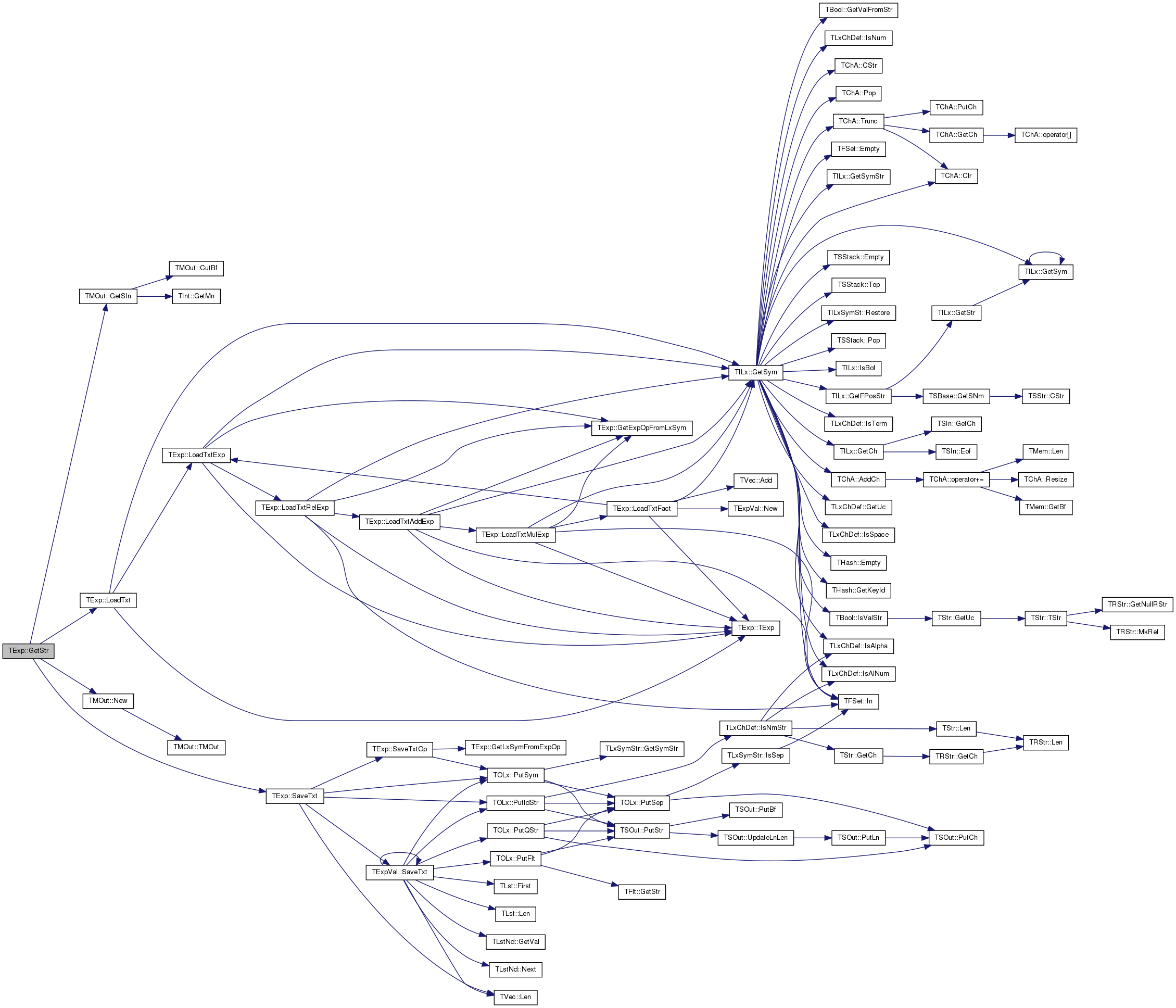

| TStr TExp::GetTopObjNm | ( | ) | const |
Definition at line 872 of file exp.cpp.
References etBiConst, etBiFunc, etFunc, etOp, etVar, ExpNm, ExpOp, ExpType, and GetExpOpStr().
{
TStr TopObjNm;
TExpType _ExpType=TExpType(int(ExpType));
switch (_ExpType){
case etOp:{
TExpOp _ExpOp=TExpOp(int(ExpOp));
TopObjNm=GetExpOpStr(_ExpOp);
break;}
case etVar:
case etBiConst:
case etFunc:
case etBiFunc:{
TopObjNm=ExpNm; break;}
default: break;
}
return TopObjNm;
}

| static bool TExp::IsExpStrOk | ( | const TStr & | ExpStr, |
| TStr & | MsgStr | ||
| ) | [inline, static] |
| static PExp TExp::Load | ( | TSIn & | SIn | ) | [inline, static] |
| PExpVal TExp::LoadAndEvalExpL | ( | const TStr & | ExpLStr, |
| bool & | Ok, | ||
| TStr & | MsgStr, | ||
| const PExpEnv & | ExpEnv = TExpEnv::DfExpEnv |
||
| ) | [static] |
Definition at line 918 of file exp.cpp.
References etUndef, ExpExpect, ExpVal, TILx::GetSym(), iloCmtAlw, iloCsSens, iloExcept, LoadTxtExp(), TStrIn::New(), syEof, TILx::Sym, sySemicolon, and TExp().
{
// create final expression value
PExpVal ExpVal;
// transform exp. str. to input stream
PSIn SIn=TStrIn::New(ExpLStr);
// create lexical
TILx Lx(SIn, TFSet()|iloCmtAlw|iloCsSens|iloExcept);
TFSet Expect=TFSet()|sySemicolon|syEof;
// load & evaluate expression separated by semicolon
while (Lx.Sym!=syEof){
// create expression
PExp Exp; Ok=true; MsgStr="Ok";
try {
Lx.GetSym(ExpExpect);
Exp=LoadTxtExp(Lx, Expect);
}
catch (PExcept Except){
Ok=false; MsgStr=Except->GetMsgStr();
Exp=PExp(new TExp(etUndef));
}
// evaluate expression
if (Ok){
ExpVal=Exp->Eval(Ok, MsgStr, ExpEnv);
//printf("%s\n", ExpVal->GetStr().CStr());
if (!Ok){
return NULL;}
} else {
return NULL;
}
}
return ExpVal;
}
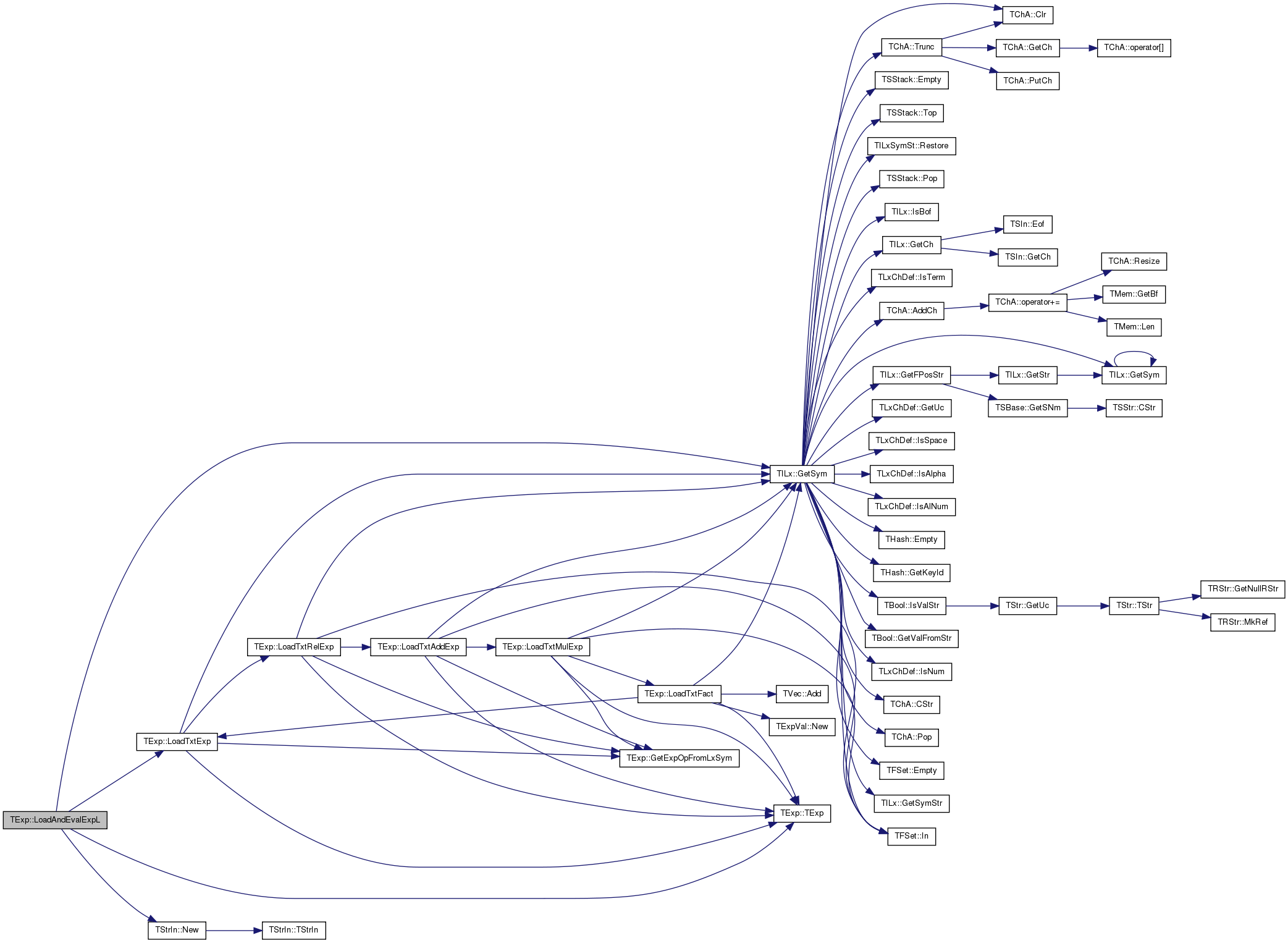
| PExp TExp::LoadTxt | ( | const PSIn & | SIn, |
| bool & | Ok, | ||
| TStr & | MsgStr, | ||
| const TFSet & | Expect = TFSet()|syEof |
||
| ) | [static] |
Definition at line 808 of file exp.cpp.
References etUndef, ExpExpect, TILx::GetSym(), iloCmtAlw, iloCsSens, iloExcept, LoadTxtExp(), and TExp().
Referenced by GetStr().
{
TILx Lx(SIn, TFSet()|iloCmtAlw|iloCsSens|iloExcept);
PExp Exp; Ok=true; MsgStr="Ok";
try {
Lx.GetSym(ExpExpect);
Exp=LoadTxtExp(Lx, Expect);
}
catch (PExcept Except){
Ok=false; MsgStr=Except->GetMsgStr();
Exp=PExp(new TExp(etUndef));
}
return Exp;
}
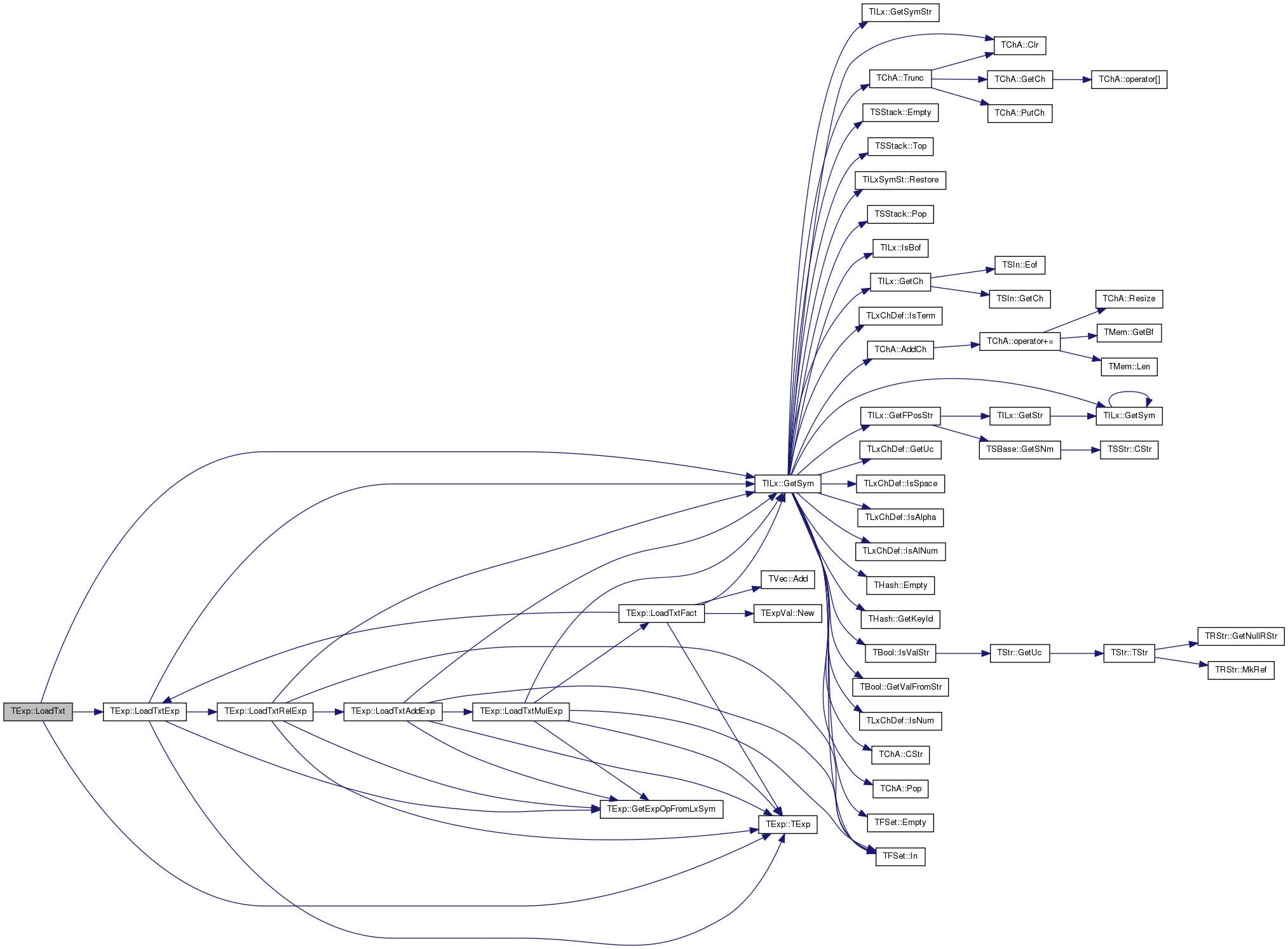

| static PExp TExp::LoadTxt | ( | const TStr & | ExpStr, |
| bool & | Ok, | ||
| TStr & | MsgStr | ||
| ) | [inline, static] |
Definition at line 238 of file exp.h.
References TStrIn::New().
{
PSIn SIn=TStrIn::New(ExpStr); return LoadTxt(SIn, Ok, MsgStr);}

| static PExp TExp::LoadTxt | ( | const TStr & | ExpStr | ) | [inline, static] |
| PExp TExp::LoadTxtAddExp | ( | TILx & | Lx, |
| const TFSet & | Expect | ||
| ) | [static, private] |
Definition at line 704 of file exp.cpp.
References AddOpSymSet, eoUMinus, eoUndef, eoUPlus, ExpOp, GetExpOpFromLxSym(), TILx::GetSym(), TFSet::In(), LoadTxtMulExp(), MulExpExpect, TILx::Sym, syMinus, syPlus, and TExp().
Referenced by LoadTxtRelExp().
{
TExpOp PrefExpOp=eoUndef;
if (Lx.Sym==syPlus){PrefExpOp=eoUPlus; Lx.GetSym(MulExpExpect);}
else if (Lx.Sym==syMinus){PrefExpOp=eoUMinus; Lx.GetSym(MulExpExpect);}
PExp Exp=LoadTxtMulExp(Lx, TFSet(Expect)|AddOpSymSet);
if (PrefExpOp!=eoUndef){
Exp=PExp(new TExp(PrefExpOp, Exp));}
while (AddOpSymSet.In(Lx.Sym)){
TExpOp ExpOp=GetExpOpFromLxSym(Lx.Sym);
Lx.GetSym(MulExpExpect);
PExp RExp=LoadTxtMulExp(Lx, TFSet(Expect)|AddOpSymSet);
Exp=PExp(new TExp(ExpOp, Exp, RExp));
}
return Exp;
}
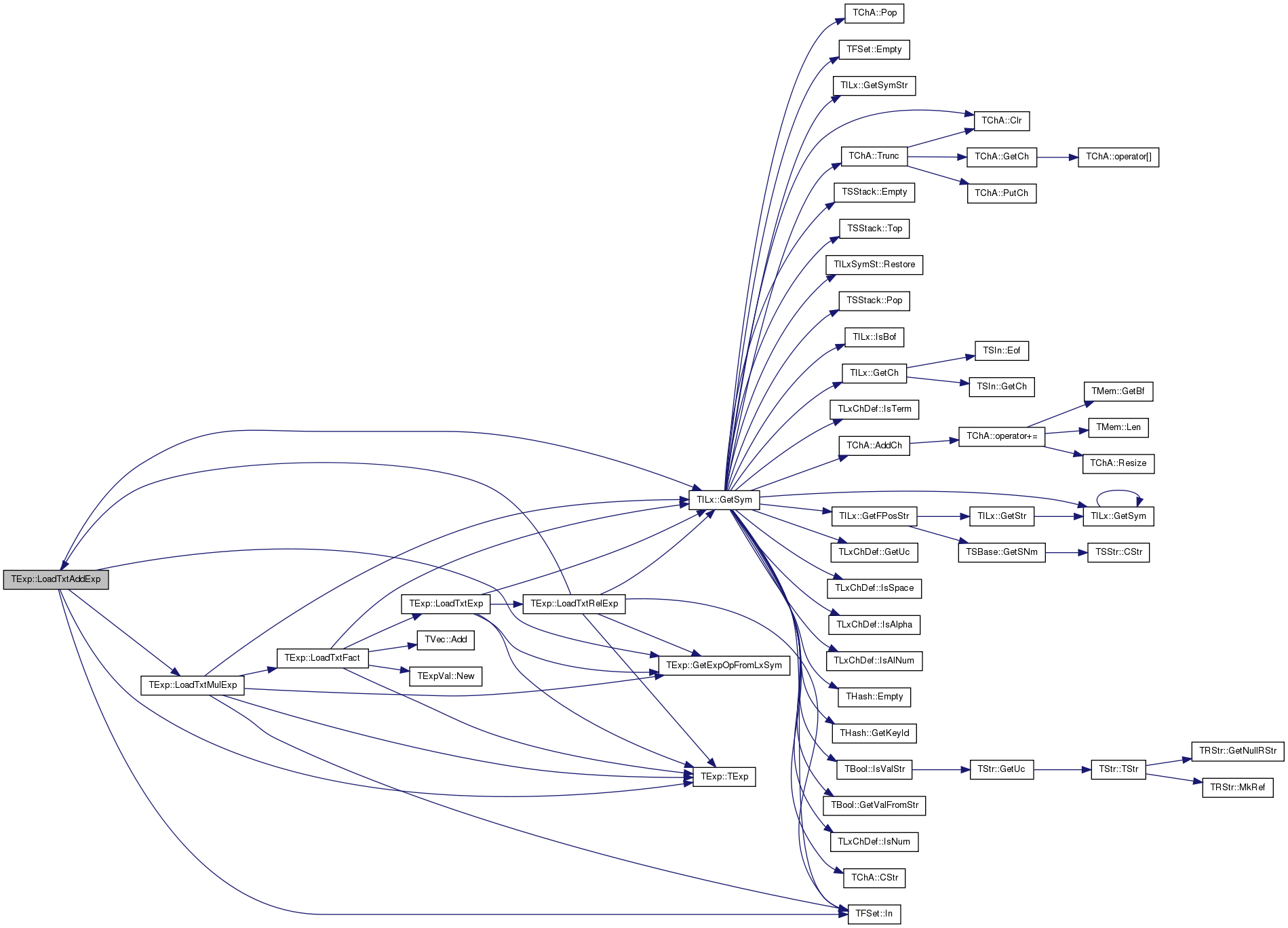

| PExp TExp::LoadTxtExp | ( | TILx & | Lx, |
| const TFSet & | Expect | ||
| ) | [static, private] |
Definition at line 731 of file exp.cpp.
References ExpExpect, ExpOp, GetExpOpFromLxSym(), TILx::GetSym(), LoadTxtRelExp(), syColon, TILx::Sym, syQuestion, and TExp().
Referenced by LoadAndEvalExpL(), LoadTxt(), and LoadTxtFact().
{
PExp Exp=LoadTxtRelExp(Lx, TFSet(Expect)|syQuestion);
if (Lx.Sym==syQuestion){
TExpOp ExpOp=GetExpOpFromLxSym(Lx.Sym);
Lx.GetSym(ExpExpect);
PExp ThenExp=LoadTxtExp(Lx, TFSet()|syColon);
Lx.GetSym(ExpExpect);
PExp ElseExp=LoadTxtExp(Lx, Expect);
Exp=PExp(new TExp(ExpOp, Exp, ThenExp, ElseExp));
}
return Exp;
}
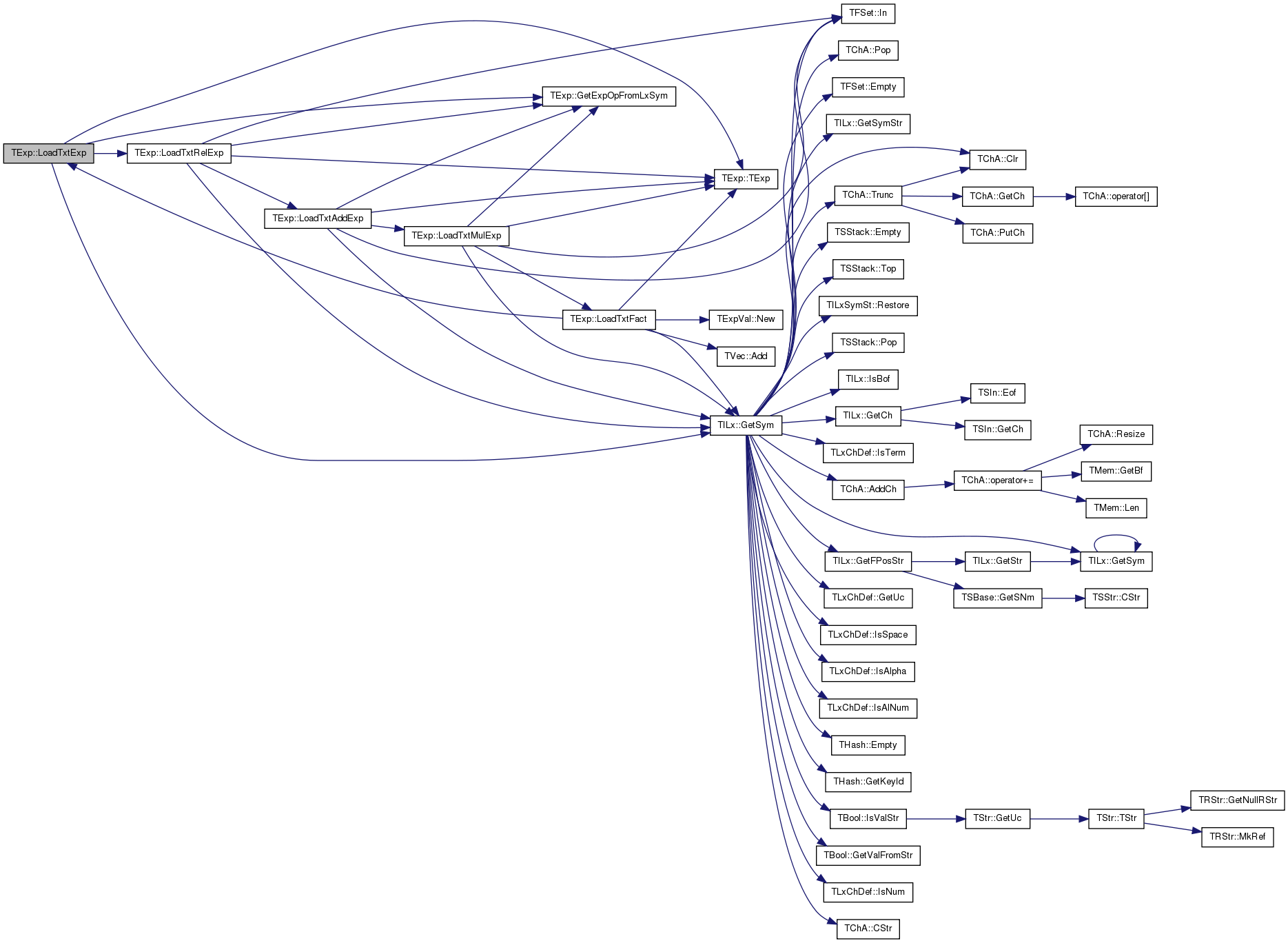

| PExp TExp::LoadTxtFact | ( | TILx & | Lx, |
| const TFSet & | Expect | ||
| ) | [static, private] |
Definition at line 652 of file exp.cpp.
References TVec< TVal >::Add(), ArgExpV, ExpExpect, ExpNm, ExpVal, Fail, TILx::Flt, TILx::GetSym(), LoadTxtExp(), TExpVal::New(), TILx::Str, syComma, syFlt, syIdStr, syLParen, TILx::Sym, syQStr, syRParen, and TExp().
Referenced by LoadTxtMulExp().
{
PExp Exp;
switch (Lx.Sym){
case syFlt:{
PExpVal ExpVal=TExpVal::New(Lx.Flt);
Exp=PExp(new TExp(ExpVal));
Lx.GetSym(Expect);
break;}
case syIdStr:{
TStr ExpNm=Lx.Str;
Lx.GetSym(TFSet(Expect)|syLParen);
if (Lx.Sym==syLParen){
TExpV ArgExpV;
Lx.GetSym(TFSet(ExpExpect)|syRParen);
while (Lx.Sym!=syRParen){
if (Lx.Sym==syComma){Lx.GetSym(ExpExpect);}
PExp ArgExp=LoadTxtExp(Lx, TFSet()|syComma|syRParen);
ArgExpV.Add(ArgExp);
}
Lx.GetSym(Expect);
Exp=PExp(new TExp(ExpNm, ArgExpV));
} else {
Exp=PExp(new TExp(ExpNm));
}
break;}
case syQStr:{
PExpVal ExpVal=TExpVal::New(Lx.Str);
Exp=PExp(new TExp(ExpVal));
Lx.GetSym(Expect);
break;}
case syLParen:{
Lx.GetSym(ExpExpect);
Exp=LoadTxtExp(Lx, TFSet()|syRParen);
Exp->IsParen=true;
Lx.GetSym(Expect);
break;}
default: Fail;
}
return Exp;
}
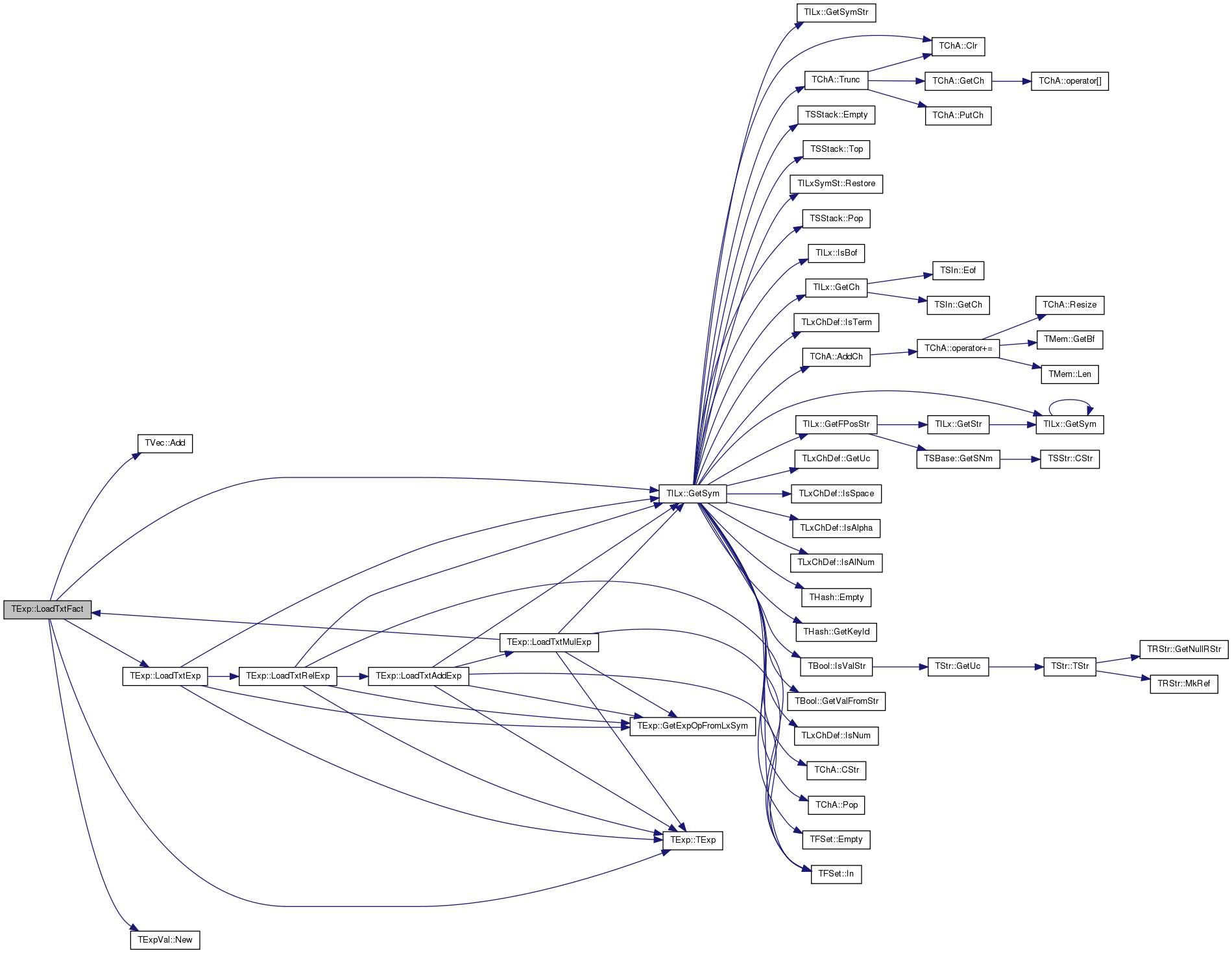

| PExp TExp::LoadTxtMulExp | ( | TILx & | Lx, |
| const TFSet & | Expect | ||
| ) | [static, private] |
Definition at line 693 of file exp.cpp.
References ExpOp, FactExpExpect, GetExpOpFromLxSym(), TILx::GetSym(), TFSet::In(), LoadTxtFact(), MulOpSymSet, TILx::Sym, and TExp().
Referenced by LoadTxtAddExp().
{
PExp Exp=LoadTxtFact(Lx, TFSet(Expect)|MulOpSymSet);
while (MulOpSymSet.In(Lx.Sym)){
TExpOp ExpOp=GetExpOpFromLxSym(Lx.Sym);
Lx.GetSym(FactExpExpect);
PExp RExp=LoadTxtFact(Lx, TFSet(Expect)|MulOpSymSet);
Exp=PExp(new TExp(ExpOp, Exp, RExp));
}
return Exp;
}
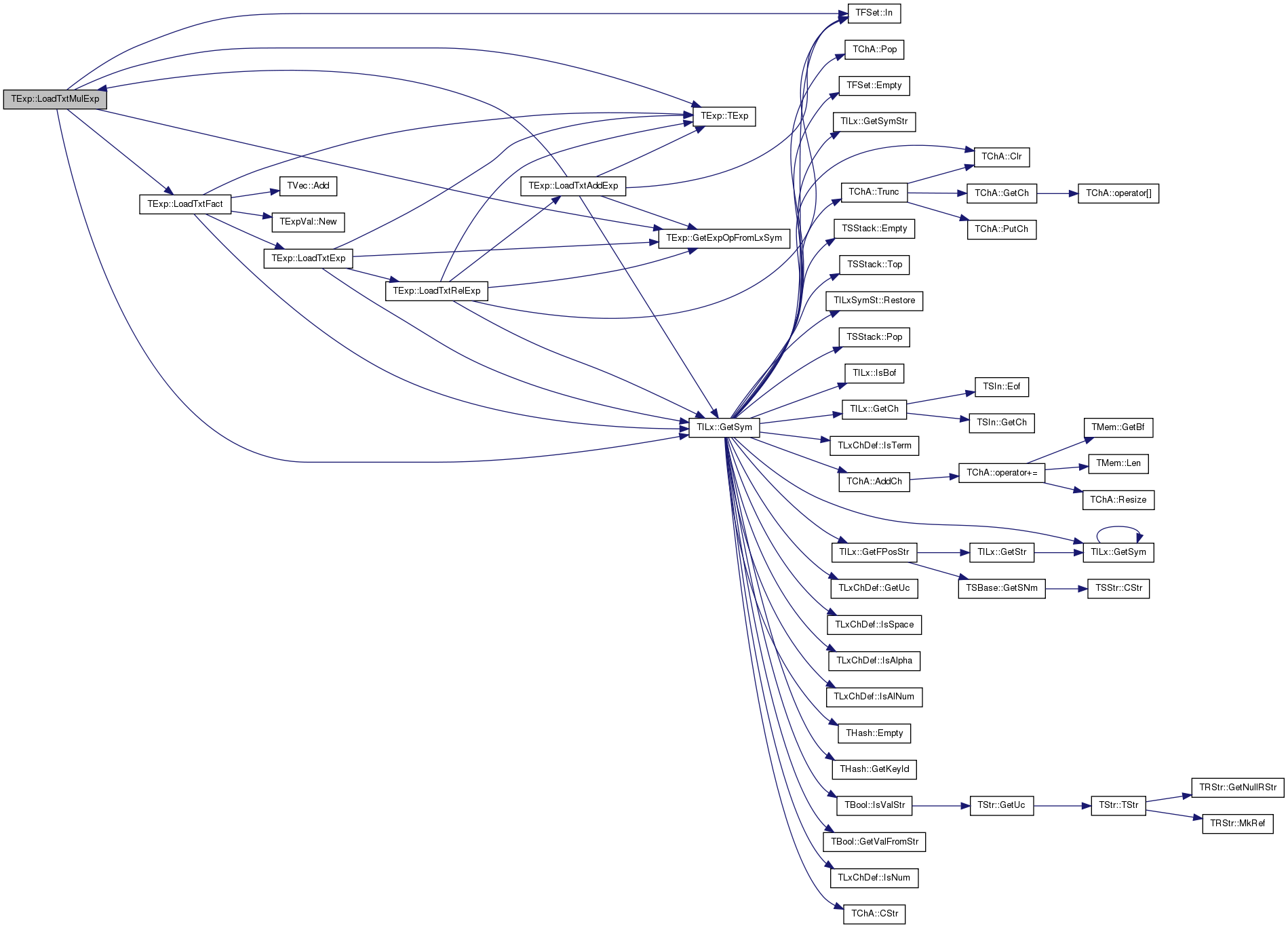

| PExp TExp::LoadTxtRelExp | ( | TILx & | Lx, |
| const TFSet & | Expect | ||
| ) | [static, private] |
Definition at line 720 of file exp.cpp.
References AddExpExpect, ExpOp, GetExpOpFromLxSym(), TILx::GetSym(), TFSet::In(), LoadTxtAddExp(), RelOpSymSet, TILx::Sym, and TExp().
Referenced by LoadTxtExp().
{
PExp Exp=LoadTxtAddExp(Lx, TFSet(Expect)|RelOpSymSet);
if (RelOpSymSet.In(Lx.Sym)){
TExpOp ExpOp=GetExpOpFromLxSym(Lx.Sym);
Lx.GetSym(AddExpExpect);
PExp RExp=LoadTxtAddExp(Lx, Expect);
Exp=PExp(new TExp(ExpOp, Exp, RExp));
}
return Exp;
}
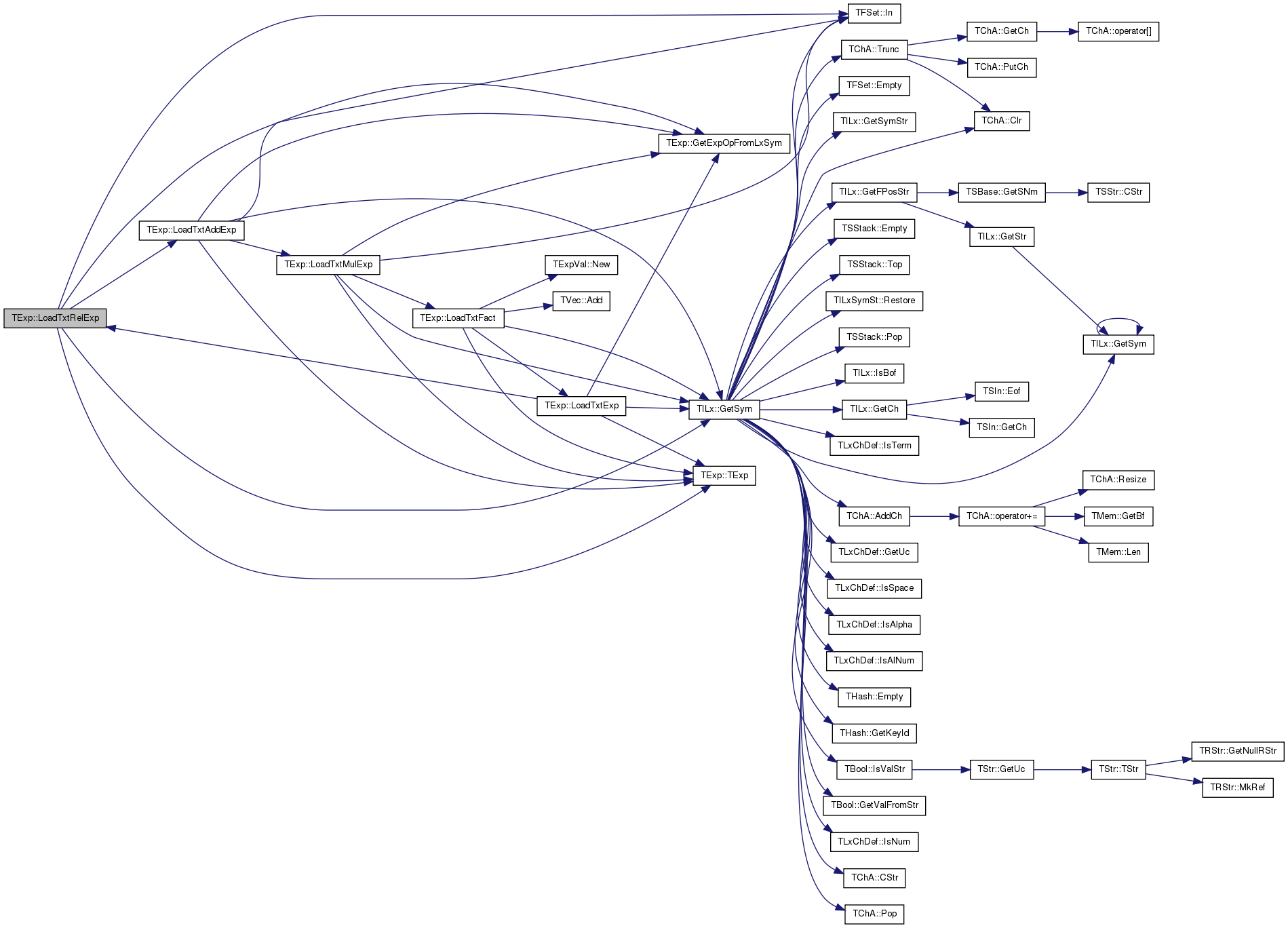

| bool TExp::operator== | ( | const TExp & | ) | const [inline] |
| void TExp::Save | ( | TSOut & | SOut | ) | const [inline] |
| void TExp::SaveTxt | ( | TOLx & | Lx | ) | const |
Definition at line 823 of file exp.cpp.
References ArgExpV, etBiConst, etBiFunc, etFunc, etLst, etOp, etVal, etVar, etVec, ExpNm, ExpType, ExpVal, Fail, IsParen, TVec< TVal >::Len(), TOLx::PutIdStr(), TOLx::PutSym(), TExpVal::SaveTxt(), SaveTxtOp(), syComma, syLBrace, syLBracket, syLParen, syRBrace, syRBracket, and syRParen.
Referenced by GetStr().
{
if (IsParen){Lx.PutSym(syLParen);}
TExpType _ExpType=TExpType(int(ExpType));
switch (_ExpType){
case etVal:
ExpVal->SaveTxt(Lx); break;
case etVec:{
Lx.PutSym(syLBrace);
for (int ArgExpN=0; ArgExpN<ArgExpV.Len(); ArgExpN++){
if (ArgExpN>0){Lx.PutSym(syComma);}
ArgExpV[ArgExpN]->SaveTxt(Lx);
}
Lx.PutSym(syRBrace);
break;}
case etLst:{
Lx.PutSym(syLBracket);
for (int ArgExpN=0; ArgExpN<ArgExpV.Len(); ArgExpN++){
if (ArgExpN>0){Lx.PutSym(syComma);}
ArgExpV[ArgExpN]->SaveTxt(Lx);
}
Lx.PutSym(syRBracket);
break;}
case etOp:
SaveTxtOp(Lx); break;
case etVar:
case etBiConst:
Lx.PutIdStr(ExpNm); break;
case etFunc:
case etBiFunc:{
Lx.PutIdStr(ExpNm);
Lx.PutSym(syLParen);
for (int ArgExpN=0; ArgExpN<ArgExpV.Len(); ArgExpN++){
if (ArgExpN>0){Lx.PutSym(syComma);}
ArgExpV[ArgExpN]->SaveTxt(Lx);
}
Lx.PutSym(syRParen);
break;}
default: Fail;
}
if (IsParen){Lx.PutSym(syRParen);}
}
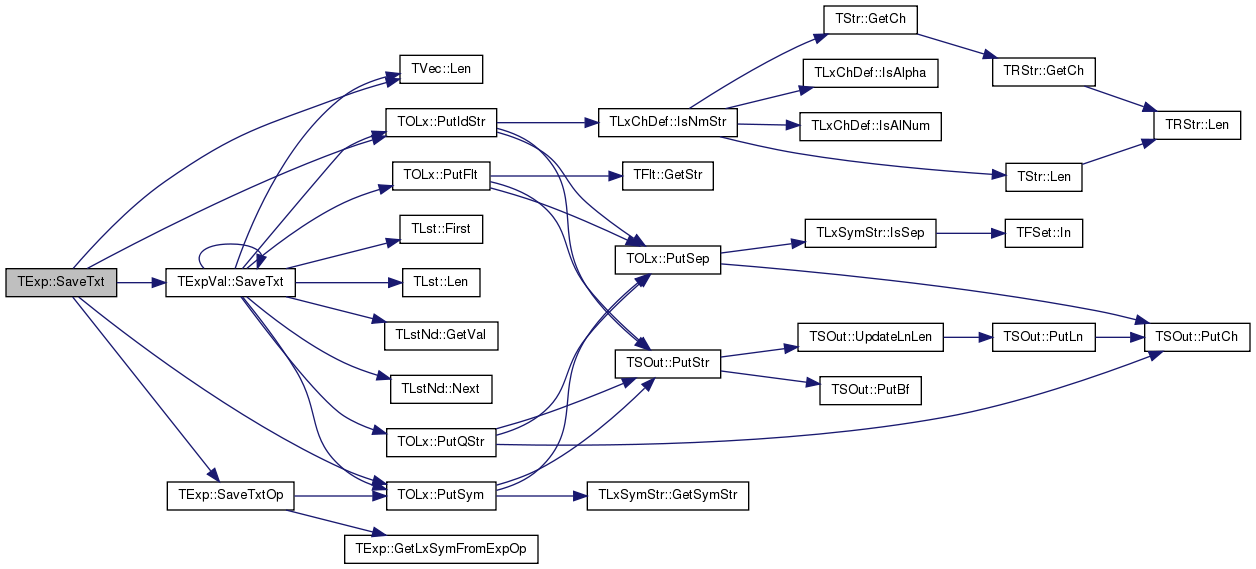

| void TExp::SaveTxt | ( | const PSOut & | SOut | ) | const [inline] |
| void TExp::SaveTxtOp | ( | TOLx & | Lx | ) | const [private] |
Definition at line 744 of file exp.cpp.
References ArgExpV, eoAnd, eoDiv, eoEq, eoGEq, eoGtr, eoIDiv, eoIf, eoLEq, eoLss, eoMinus, eoMod, eoMul, eoNEq, eoNot, eoOr, eoPlus, eoUMinus, eoUPlus, etOp, ExpOp, ExpType, Fail, GetLxSymFromExpOp(), IAssert, TOLx::PutSym(), and syColon.
Referenced by SaveTxt().
{
IAssert(TExpType(static_cast<int>(ExpType))==etOp);
TExpOp _ExpOp=TExpOp(int(ExpOp));
TLxSym OpSym=GetLxSymFromExpOp(_ExpOp);
switch (_ExpOp){
case eoUPlus:
case eoUMinus:
case eoNot:
Lx.PutSym(OpSym); ArgExpV[0]->SaveTxt(Lx);
break;
case eoPlus: case eoMinus:
case eoMul: case eoDiv:
case eoIDiv: case eoMod:
case eoAnd: case eoOr:
case eoEq: case eoNEq:
case eoLss: case eoGtr:
case eoLEq: case eoGEq:
ArgExpV[0]->SaveTxt(Lx); Lx.PutSym(OpSym); ArgExpV[1]->SaveTxt(Lx);
break;
case eoIf:
ArgExpV[0]->SaveTxt(Lx); Lx.PutSym(OpSym);
ArgExpV[1]->SaveTxt(Lx); Lx.PutSym(syColon); ArgExpV[2]->SaveTxt(Lx);
break;
default: Fail;
}
}


const TFSet TExp::AddExpExpect [static, private] |
Definition at line 198 of file exp.h.
Referenced by LoadTxtRelExp().
const TFSet TExp::AddOpSymSet [static, private] |
Definition at line 197 of file exp.h.
Referenced by LoadTxtAddExp().
TExpV TExp::ArgExpV [private] |
Definition at line 195 of file exp.h.
Referenced by EvalExp(), EvalExpOp(), GetArgExps(), GetArgExpStr(), LoadTxtFact(), SaveTxt(), SaveTxtOp(), and TExp().
TCRef TExp::CRef [private] |
TExpBi TExp::ExpBi [static, private] |
TInt TExp::ExpBiId [private] |
const TFSet TExp::ExpExpect [static, private] |
Definition at line 199 of file exp.h.
Referenced by LoadAndEvalExpL(), LoadTxt(), LoadTxtExp(), and LoadTxtFact().
TStr TExp::ExpNm [private] |
Definition at line 192 of file exp.h.
Referenced by EvalExp(), GetTopObjNm(), LoadTxtFact(), SaveTxt(), and TExp().
TInt TExp::ExpOp [private] |
Definition at line 193 of file exp.h.
Referenced by EvalExpOp(), GetTopObjNm(), LoadTxtAddExp(), LoadTxtExp(), LoadTxtMulExp(), LoadTxtRelExp(), and SaveTxtOp().
TInt TExp::ExpType [private] |
Definition at line 189 of file exp.h.
Referenced by EvalExp(), GetTopObjNm(), SaveTxt(), SaveTxtOp(), and TExp().
PExpVal TExp::ExpVal [private] |
Definition at line 191 of file exp.h.
Referenced by Eval(), EvalExp(), EvalExpOp(), LoadAndEvalExpL(), LoadTxtFact(), and SaveTxt().
const TFSet TExp::FactExpExpect [static, private] |
Definition at line 198 of file exp.h.
Referenced by LoadTxtMulExp().
TBool TExp::IsParen [private] |
const TFSet TExp::MulExpExpect [static, private] |
Definition at line 198 of file exp.h.
Referenced by LoadTxtAddExp().
const TFSet TExp::MulOpSymSet [static, private] |
Definition at line 197 of file exp.h.
Referenced by LoadTxtMulExp().
const TFSet TExp::RelExpExpect [static, private] |
const TFSet TExp::RelOpSymSet [static, private] |
Definition at line 197 of file exp.h.
Referenced by LoadTxtRelExp().
const TFSet TExp::UAddOpSymSet [static, private] |